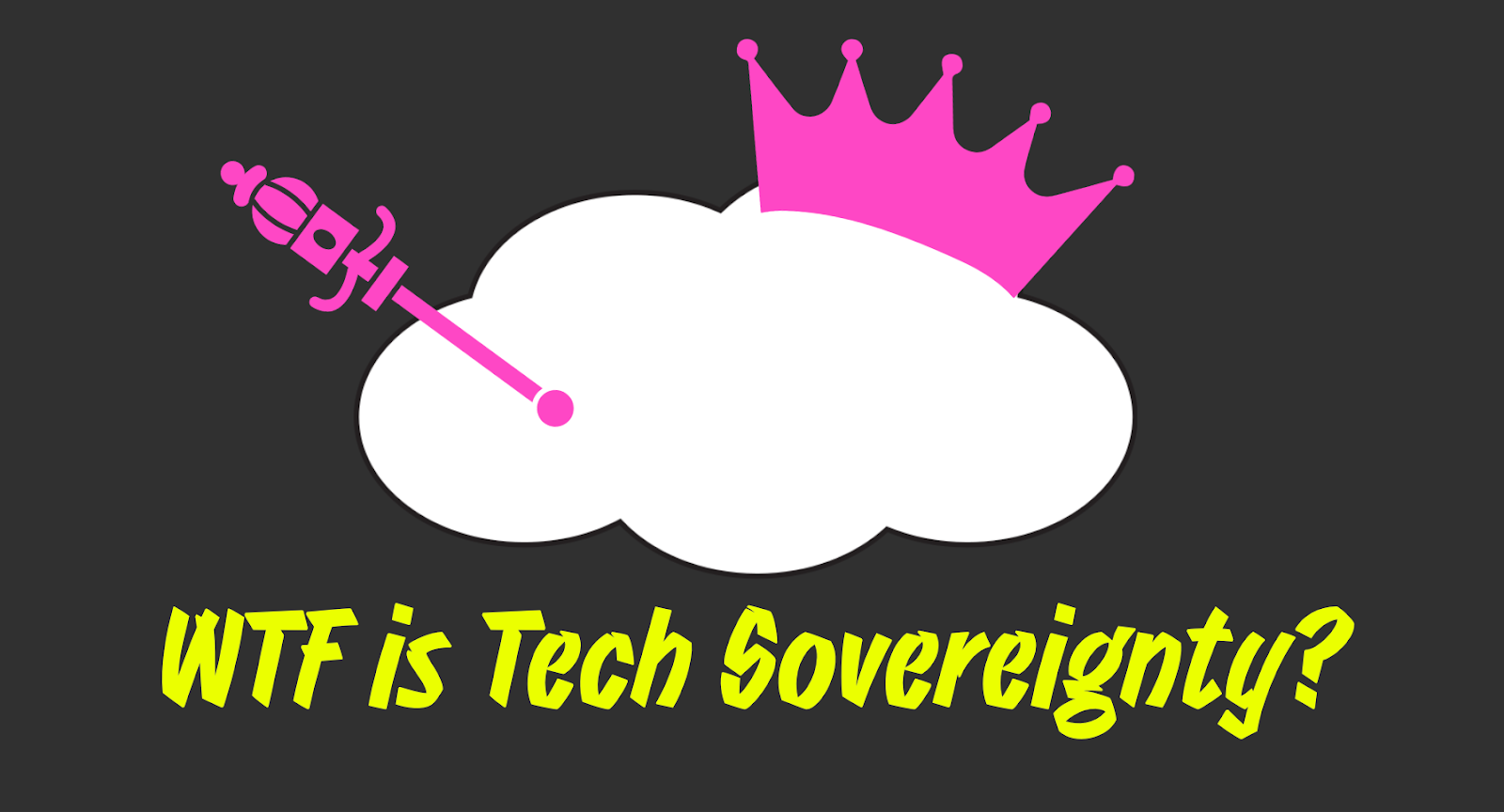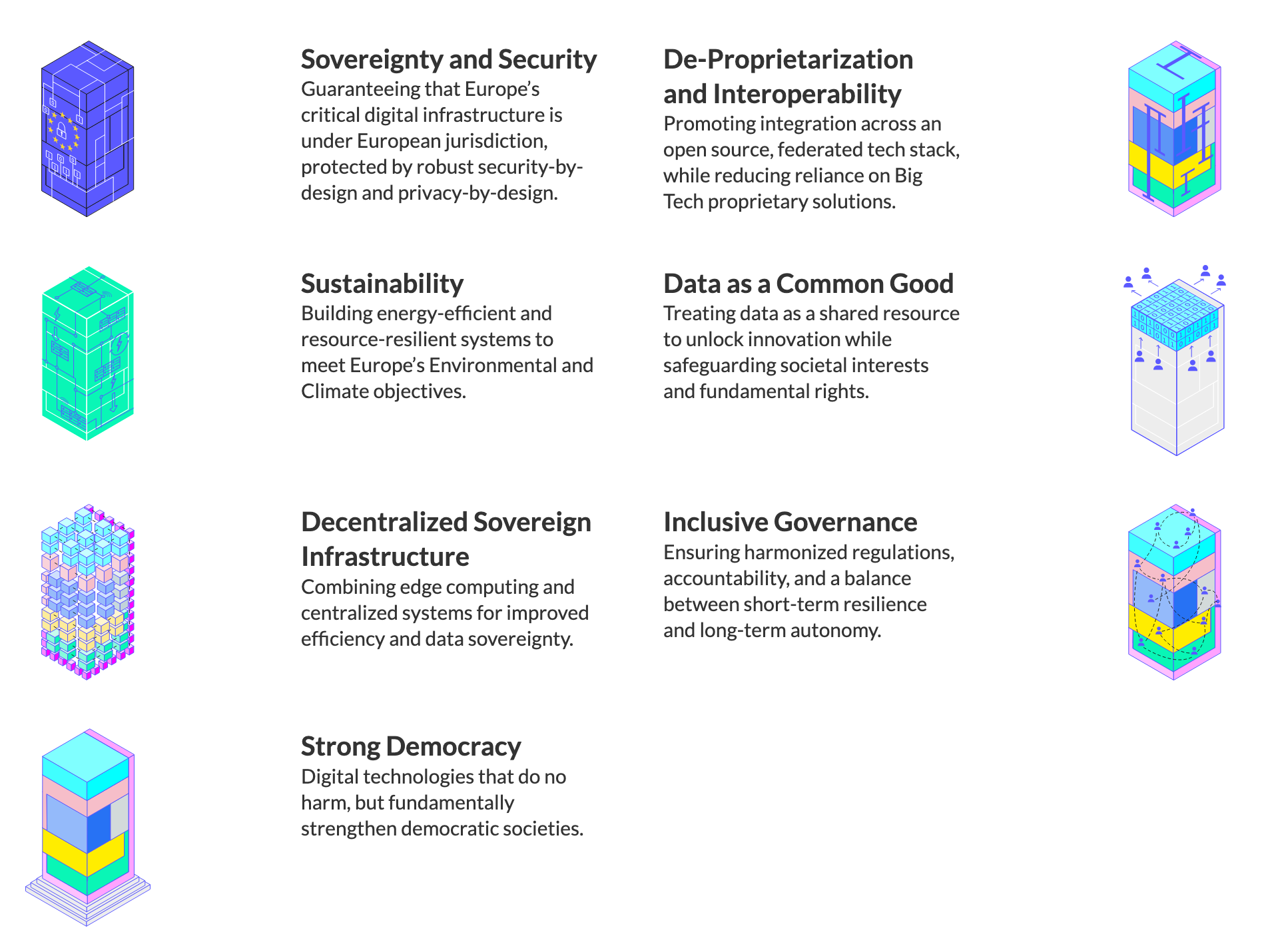WTF is tech sovereignty?
Spoiler – it’s not just about geopolitics, it's about you.

If you’re reading this newsletter, you’ve probably started – or are thinking about starting – reducing your reliance on Big Tech. Perhaps you’ve left Instagram, shifted to Protonmail, or (like me) are starting the painful task of transferring everything from your iCloud to a trusty IRL hard drive.
But it's not easy. Big Tech products are designed to make us reliant on them. That’s why the EU recently fined Apple €500m, for example, for its restrictions on apps outside the App Store – preventing users from accessing cheaper deals.
With the threat of a trade war looming over Europe, and Big Tech regulation being such a political hot potato right now, it's promising that the EU is going ahead with penalties like this. At the same time, considering the hundreds of billions the tech giants earn in revenue each year, these fines aren’t much more than a gentle slap on the wrist.
The unpredictability of the Trump administration is bringing up more existential questions for the rest of the world, too. And this comes on top of the already very real danger of cyber attacks in Europe. The EU is increasingly concerned about ‘tech sovereignty’ – having control over the technology its citizens use – and in turn reducing its reliance on foreign tech.
Under the US CLOUD Act, for example, the US government could compel US-based cloud providers to supply data stored on servers regardless of where in the world they are located…Doesn’t sound risky at all, eh?
I spoke to Sherif Elsayed-Ali, executive director of the Future of Technology Institute, about what’s going on:
“Today the cloud market is dominated by Amazon, Microsoft and Google. The private and public sectors alike rely on them, including defence and intelligence agencies. We need alternatives that are not subject to the political whims of one president or government.”
Sherif, who says he prefers the term digital independence to tech sovereignty, added that the independence of services like public health and energy also need protecting here. He wants to see Europe build “rival products that are competitive and mean that US companies have to fight for customers, not take them for granted – and critically, resist political pressure."
One approach is the Eurostack initiative. Put together by economists and tech policy experts, it aims to “establish the continent as a leader in digital sovereignty.” They suggest a European tech infrastructure made up of microchips, cloud servers, algorithms and AI. Here’s a visualisation of what they’re about:

Colin Hayhurst heads up Mojeek, a UK-based company building a “truly independent alternative to Google.” Going for an impressive twenty years, Mojeek has its own way of finding and ranking websites, instead of relying on Google or Microsoft, and it doesn’t track what users do.
“We don’t do any personalisation, so two people putting in the same search term…get exactly the same results. We call this information neutrality,” explained Colin, emphasising the importance of diversifying search rather than having “one company deciding what we should be looking at.”
Colin is hopeful that the recent US ruling against Google’s monopoly over digital advertising, and the US Department of Justice's proposed breakup of Google, will help smaller tech companies around the world to grow.
Meanwhile, the EU is finalising its own investigation – and all eyes are on whether it will force a breakup of the company’s adtech empire (as it proposed in 2023) or back down in the face of threats from the Trump administration. Watch this space for an upcoming PvBT campaign on this 😉
For now though, Mojeek encounters challenge after challenge in the UK, from a lack of state funding to the huge resources needed to comply with the Online Safety Act.
In March, nearly a hundred smaller European technology firms and lobby groups urged the European Commission President to create a sovereign infrastructure fund to ramp up public investments in cutting-edge technologies.
Sherif held an online discussion earlier this month about the future of European tech, which included founders of tech start-ups such as France Digitale, iconomy, and Pleias. The experts put forward how start-ups in the region can be supported, including directing pension funds investments in US tech into European tech, collaboration between start-ups from different countries to gain contracts, and seizing emerging technologies like AI before they are monopolised.
What we don’t want, though, is European replicas of Big Tech, and all the harms we know come with it. This is of particular concern to Corinne Cath, an anthropologist studying the politics of internet governance, and head of digital at ARTICLE 19.
She told me she finds human-rights focused terms like digital self-determination are more helpful here, adding: “I would rather we have a conversation about how to build a different world...let’s try to do something that is environmentally conscious and social justice oriented instead.”
This could mean internet organisations exploring cooperative or community-owned models focused on the public interest, for example, or start-ups thinking about how their tech can be as energy efficient as possible amidst the climate crisis.
Corrine has been researching the use, or proposed use, of Big Tech cloud services by state and non-state bodies in the Netherlands, its implications, and efforts to resist this trend. Following resistance, proposed moves to Amazon and Microsoft cloud services by an internet governance body, and the Dutch government itself, have been put on hold. The Dutch cloud community is also looking into concrete alternatives like “Cloud Kootwijk”, which brings together local providers to develop viable alternatives to hyperscaler clouds.
“When an organisation becomes dependent on a cloud, it starts to lose control, right?” said Corinne, explaining how the way software functions or how services are delivered becomes defined by the corporate cloud. Corinne gave an example of a worker at Amsterdam’s local government who used a “scrappy tool” made in-house to get feedback from citizens. They told her it worked really well, but it had to be taken down because it wasn’t compatible with Microsoft Azure.
Whether you prefer the term tech sovereignty, tech independence or digital self-governance, the way we approach the topic should be the same. Yes, the Big Tech monopoly under Trump’s leadership is a security threat. But it's also a threat to our human rights, our societies and our personal lives – harms which pre-date the current US administration.
But if Trump’s erratic leadership and aggressive foreign policy can push the UK, EU and other jurisdictions to re-think our overreliance on Big Tech, with our digital rights and planet in mind, there may be light at the end of the tunnel...

